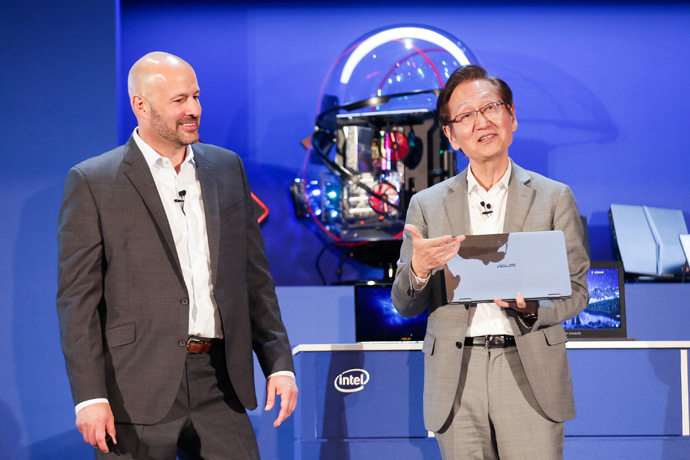Intel Sucker Punches Qualcomm With Its Own ‘Always On PC’ Announcement
Hot on the heels of the official announcement about the forthcoming “Always Connected” Qualcomm Snapdragon 835-based Windows 10 laptops, Intel made its own “Always On” PC announcement.
The oh-so-subtle difference in nomenclature is kind of funny, but Qualcomm probably isn’t laughing. Just as Qualcomm was making a play for a chunk of the Intel-dominated laptop market, led by its mighty X16 gigabit LTE modem, Intel’s announcement amounted to a sucker punch--although we’re not sure the blow landed firmly.
Whereas Qualcomm’s announcement was about a whole new platform upon which OEMs can build, Intel’s was more or less just a reminder of what it’s already been doing, with a sprinkling of me-too branding. Intel wishes to remind you that its chips are also in low-power, portable, fanless form factors, and it also has modem technology that gives those devices always-on LTE connectivity.
Notably, though, the X16 modem promises gigabit (peak) speeds; neither of the modems Intel touted, the XMM 7260 and XMM 7360, approach that. However, Intel said that it’s all-in on the eSIM stuff that Qualcomm had also touted. An Intel blog post read in part, “Intel is investing in eSIM and LTE technologies, and its leaders are working closely with Microsoft to validate eSIM-enabled always connected platforms with multiple carriers using the Intel XMM 7260 modem and the upcoming Intel XMM 7360 modem.”
The follow-up swing that Intel took, though, was when it brought Asus’ Johnny Shih onstage to have him show off his “always connected PC,” which is codenamed “Kukuna.” Asus is one of the OEM partners that pledged to build something on the new Qualcomm platform. The company didn’t have any Snapdragon 835-based mockups to show, but there was Shih, smiling alongside Intel’s Gregory Bryant, holding a shiny 2-in-1 that was equipped with an Intel processor and modem. Wham.
(Meanwhile, Microsoft leans back and enjoys the show. Come on guys, don't fight, there's enough Windows for everyone.)
It was a public but subtle dig towards Qualcomm, and it shows that Intel is gearing up for a competition in this space. And of course, when big companies compete, consumers win. We’ll look forward to Qualcomm’s counterpunch and hopefully a full-on slugfest between the two giants as they push themselves--and each other--to build better devices.
Get Tom's Hardware's best news and in-depth reviews, straight to your inbox.
Seth Colaner previously served as News Director at Tom's Hardware. He covered technology news, focusing on keyboards, virtual reality, and wearables.
-
alextheblue "there was Shih, smiling alongside Intel’s Gregory Bryant, holding a shiny 2-in-1 that was equipped with an Intel processor and modem. Wham."Reply
WHAM! Right in the wallet. Do you really think the 835 systems are competing head-to-head with these Intel Core-powered systems? They'll likely undercut them by $100-200 depending on segment. Where's the affordable Windows tablets and 2-in-1s - oh that's right, there's no more ULP Atoms... everything is high-dollar Core or higher-watt models. Or both expensive and higher watt. SD 835 isn't a miracle, but it will allow for Windows to land in a few segments that Intel was no longer targeting. When they support additional ARM processors that also means inexpensive and low-power tablets/hybrids/slimbooks. Basically, Chromebook/Android territory. -
falchard The great thing about the Qualcomm 835 is that my Windows Phone will finally be able to use x86 programs in Continuum.Reply -
alithegreat One of the biggest problem of the pc market is there is no competition on OS. Yeah it is troublesome to have more than one going around but, for years voice recognition, motion sensors did not arrive on PC just because windows domination. It's just like CPU Market.Reply -
DavidC1 I agree with ALITHEGRET. PC market has no competition in the OS market. It's Microsoft that needs genuine competition.Reply
Also, neither extremes are true regarding Intel vs ARM for Windows PCs.
-Let's say even if Intel dies off tomorrow, it'll take decades for ARM to take over the PC market. What this announcement will allow is have Intel not take off its foot off the pedal regarding low-power PCs.
Also, they do have chips for the cheap 2-in-1s. Well, Tablets too. The Apollo Lake platform is used in few Tablets and its basically a value 2-in-1 platform. What they don't have is even lower power than that.
-If Intel does nothing though, they can be noticeably threatened.
Emulators have their limits. Even among Windows versions, compatibility issues exist that don't get fully addressed until years after the release. An entirely new instruction set will be worse. Intel will be fine as long as they don't completely ignore it. -
tntom What we are really waiting to see happen is for Apple to finally replace the Macbook Air with an A10 powered version running either iOS or a hybrid MacOS. This would put the competition into perspective. And Apple could easily pull this off $600 and 18hrs of battery life. Intel has avoided selling low cost devices simply because they have been able to get away with it.Reply -
sh4dow83 I feel like I'm missing something.Reply
My MacBook is already "always on"?
So is my Intel-powered workstation?
So is my smartphone?
What's the big deal? -
velocityg4 x16 Gigabit LTE is something which sounds cool but is fairly pointless right now. Considering the cost of data you could theoretically blow through a months data in a few seconds. Does anyone even have a truly unlimited data plan for laptops?Reply
Then given the limitations of the form factor. I can't think of anything you could do which would make use of a Gigabit internet connection. Unless you were running an Web/FTP server over LTE. -
Slesreth Reply
Well said! It has been a good year for big company competition!19758643 said:And of course, when big companies compete, consumers win. We’ll look forward to Qualcomm’s counterpunch and hopefully a full-on slugfest between the two giants as they push themselves--and each other--to build better devices."
Intel Sucker Punches Qualcomm With Its Own ‘Always On PC’ Announcement : Read more

